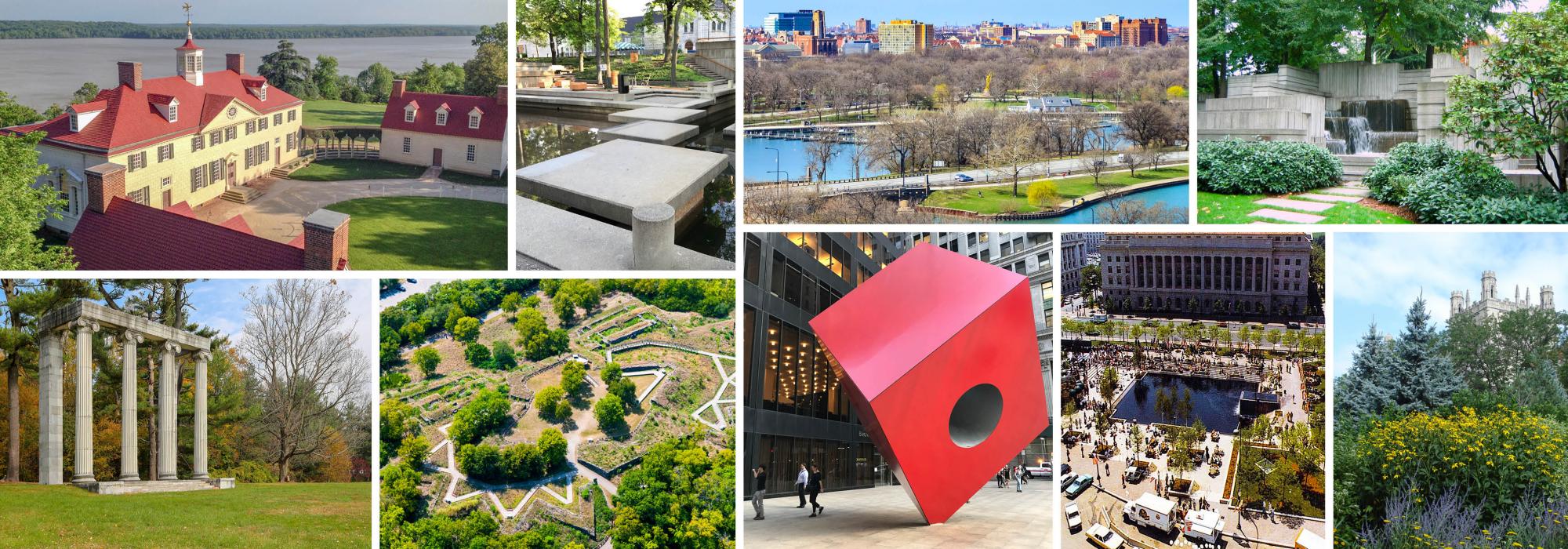Meeting the Challenges of Our Most Challenging Year
A message from Charles Birnbaum and The Cultural Landscape Foundation:
Dear Friends,
It’s perhaps appropriate that as TCLF celebrates its twentieth anniversary, we’re being asked more than ever before to advocate for threatened cultural landscapes throughout the nation. If you’ve been following our regular e-newsletters and visiting our website, you may know that in 2018 we have been called upon to help save more than 30 landscapes in nearly as many states. From the works of Frederick Law Olmsted, Sr., to the Modernist masterpieces of Lawrence Halprin and M. Paul Friedberg, to historic sites and even national parks, we always answer the call.
Throughout the course of the year, we have brought attention to endangered landscapes with headlines in more than twenty major newspapers across the country, including the New York Times, the Washington Post, the Chicago Sun-Times, the Chicago Tribune, the Minneapolis Star Tribune, the Philadelphia Enquirer, Politico, the Providence Journal, and the Savannah Morning News. We’ve also been featured on local and national television news outlets and frequently covered in myriad specialty publications, including Curbed, the Architect’s Newspaper, Crain’s Chicago, Dezeen, the Art Newspaper, and a host of others.
I’m pleased to tell you that all the hard work and media attention are paying dividends. So far in 2018, we’ve helped achieve landmark agreements to safeguard George Washington’s Mount Vernon in Virginia, Fort Negley Park in Nashville, Tennessee, Princeton Battlefield in New Jersey, Freeway Park in Seattle, Washington, and Carousel Park in Santa Monica, California. We’ve intervened to effect real, measurable change at Minnesota’s Peavey Plaza, Washington, D.C.’s, Pershing Park, and Chicago’s Jackson Park and Midway Plaisance, and we also moved quickly to stop plans that would have permanently harmed Isamu Noguchi’s iconic plaza at 140 Broadway and the Frick’s Russell Page-designed viewing garden, both in New York City. Positive outcomes for many other threatened sites are now well within reach, and our recently launched Landslide 2018: Grounds for Democracy initiative has presented even more opportunities to work on behalf of our shared landscape legacy.
And yet advocacy is just part of what we do. As a non-profit educational foundation that documents cultural landscapes and their designers, we also offer free tours, host major conferences and symposia, create award-winning exhibitions, produce video oral histories, provide technical assistance, and publish books and guidebooks—all managed by a small staff whose dedication allows us to punch above our weight. But doing all of this requires resources, which is why I’m now asking for your support to help us meet the challenges of our most challenging year. Your tax-free donation will allow TCLF to continue to increase its work in advocacy and education, which, I think you’ll agree, is needed now more than ever.
If you’d like specific information about any of our programs or how you can support them, please get in touch with me directly. We can’t do what we do without you!
Sincerely,

Charles A. Birnbaum, FASLA, FAAR, President + CEO
The Cultural Landscape Foundation
202-483-0553 / charles@tclf.org

“Fort Negley Park is a Civil War monument in the South that celebrates the preservation of the United States of America. The question of what will happen to it has roiled Nashville for more than a year…In its annual Open Season on Open Spaces report, the Cultural Landscape Foundation in Washington recognized Fort Negley as one of 13 nationally significant landscapes in need of protection.”
-Margaret Renkl, New York Times, January 29, 2018
“We are greatly appreciative of the Cultural Landscape Foundation’s voice in the Save Princeton Coalition, which helped make this moment a reality.”
-Lindsey Morrison, National Battlefield Trust, May 31, 2018
“Charles Birnbaum, a former National Park Service staffer who is now president of the nonprofit Cultural Landscape Foundation, said projects that approach the regulatory process in a collaborative manner tend to fare better—“It’s such an incredible gift to our built city, the thoroughness that happens on these [review] committees,” Birnbaum said.
-Peggy McGlone, Washington Post, June 29, 2018
“For all the talk of transparency, the Obama Foundation has never answered one essential question: Why must National Register-designated public parkland be taken for the OPC when other options exist?” said Charles A. Birnbaum, head of the Cultural Landscape Foundation.
-Lolly Bowean, Chicago Tribune, May 23, 2018
“The federal government has invited comments on “adverse effects” the Obama Presidential Center may have on Jackson Park and a leading landscape advocacy group has three big ones. Olmsted’s design “was intended to lead visitors on a choreographed journey through passages of landscape scenery. Neither the location nor the disposition of the roads were accidental,” wrote Charles Birnbaum, the president and CEO of the nonprofit Cultural Landscape Foundation in a submission for the federal review.
-Lynn Sweet, Chicago Sun-Times, January 3, 2018
“Some green space should never be built upon...Indeed, the [Rhode Island] State House lawn was cited in 2017 by the Cultural Landscape Foundation, a national organization dedicated to preserving landscapes around the country, as a threatened landscape because of a proposal to build a transit center on it.
-Deming Sherman / Brent Runyon, Providence Journal, April 19, 2018
“Work began Monday on a $10 million renovation of Peavey Plaza, the sunken park next to Orchestra Hall and across the street from Brit's Pub on Nicollet Mall…The Preservation Alliance of Minnesota and the Cultural Landscape Foundation sued the city over the plans, and in a 2013 settlement, the council gave up the idea of filling in the plaza.”
-Adam Belz, Minneapolis Star Tribune, May 14, 2018





